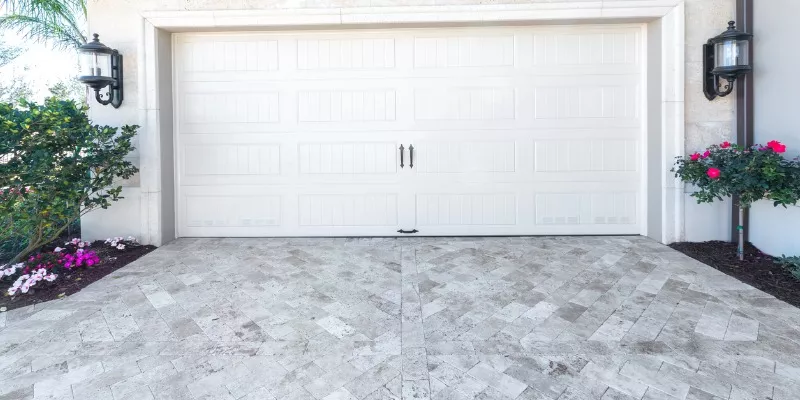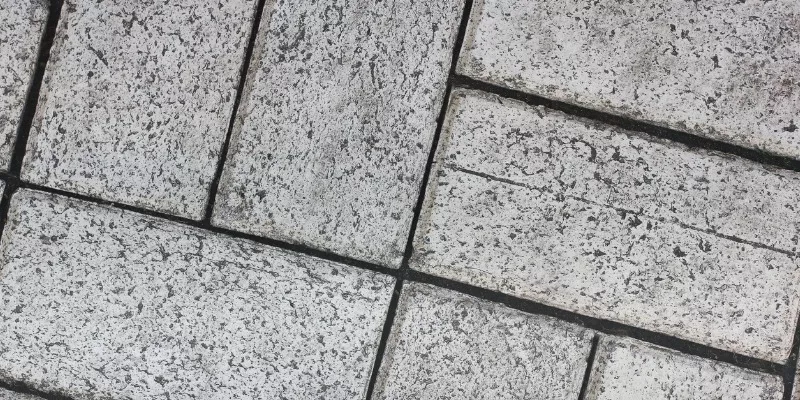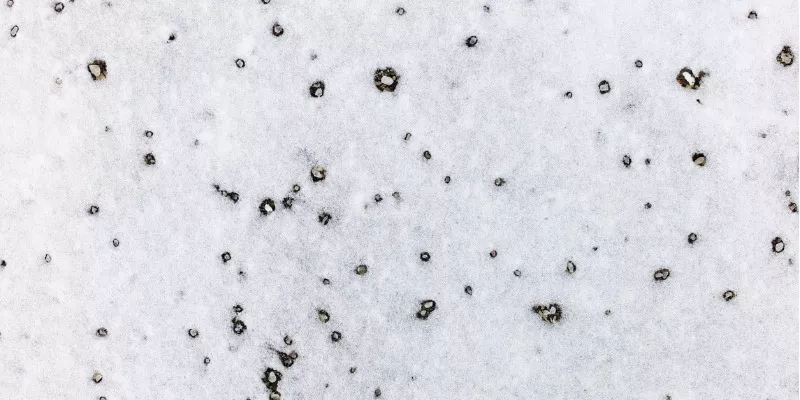
When your interlocking was first installed, it looked great. Over time, dirt, stains, and efflorescence will accumulate on the interlock to undermine its good looks. If you try to clean your interlock improperly, you can further damage it, and even encourage weeds to grow. There are secrets to caring for your interlock and making it look brand-new even twenty years down the line. We’re ready to spill those secrets in this complete interlock care guide. Get the answers to all of your interlock maintenance questions below.
How to Clean Interlock
The first thing you need to know about caring for your interlocking is how to clean it properly. It’s a three-step process that starts with washing, then targeting stains, then adding aggregate, then applying sealant. Here’s a guide on how to do it.
Tools you need:
- Garden hose
- Cleaner of your choice (see “what can I use to clean my pavers” below)
- Water
- Bucket
- Scrubbing brush
- Broom
- Sand or aggregate of your choice
- Roller
Step One: Wash
You can start by simply washing the pavers with basic soap and water. Create a mixture of the water and soap and pour it onto the pavers. Let it sit to help bring up stains, or just start scrubbing with the broom or the scrub brush. Once you’ve scrubbed, rinse the pavers with the hose, but not a pressure washer.
Step Two: Clean
Now that the pavers have dirt and minor stains removed, you can look to see if there are any stains you can identify. Ideally, you’d know what the stain is, so that you can select the right cleaning product. We suggest you choose a dedicated cleaner from Techniseal or Alliance Gator. These special formulas are designed to lift specific stains from your pavers, including those caused by grease, oil, tar, rubber, paint, and rust. Follow the directions on the bottle or read our section on removing stains below.
Step Three: Sand or Aggregate
In the process of cleaning or wear-and-tear, the interlocking may lose some of its sand. You’ll need to refill the gaps by pouring sand down and sweeping it into the cracks. The sand should reach about halfway up the side of each stone.
Step Four: Seal
Once cleaned, your pavers may need to be resealed. There are many sealant products available, which we cover below. Choose the one that will give the look you want and apply it with the roller brush in smooth, long strokes. Read more about sealants below.
How Do You Remove Stains from Interlock?
Some stains can be especially challenging to remove from interlocking, especially if they have had time to soak in. Ideally, if you spill something on the interlocking or notice a stain, you’ll start by applying kitty litter or another absorbent material to prevent it from soaking in.
Once there is a stain, you can remove it with the right product from Techniseal. There are dedicated cleaners for oil and grease, rust, rubber, paint, tar and efflorescence. All you need to do is choose the right cleaner and apply it according to the instructions.
How to Remove Oil Stains from Interlocking Driveway
While instructions for each Techniseal product may vary slightly, giving you an overview of the oil stain cleaning process will give you a good idea of the overall stain removing process. Remember that you have to do this after washing and before sealing. If you’ve sealed over a stain, you may never get it out.
To remove oil stains, you’ll use Gator XP Oil and Grease Remover. This product is very simple. Shake the container, spray it on the stain and wait. Once the product is dry, you simply sweep it off, and the oil should go with it. You may need to rinse to get all of the cleaner off, but don’t use a pressure washer.
How to Clean Interlocking Garage Floor Tiles
Is your garage floor interlocking? That can be challenging, as garages tend to collect some of the stains that are more challenging to remove. You certainly don’t want to try methods involving vinegar or dish soap, as they are not going to provide the deep clean you need. We suggest you use professional cleaning products from Alliance Gator to clean your garage floor and remove pesky stains like paint and oil.
What Can I Use to Clean My Pavers?
You have a range of options when it comes to cleaning your pavers. Simple dirt can be easily removed from pavers with household detergent, or dishwashing soap. However, for more in-depth cleans, you will want to use a professional product, such as:
- Gator Rubber, Paint and Tar Remover +
- Gator Shampoo
- Gator XP Oil and Grease Remover
- Gator Efflorescence & Slurry Remover
- Gator Rust Remover
How Do You Clean Pavers with Vinegar?
You can try to clean pavers with vinegar, but you should not expect professional-level results from it. Vinegar can be a good substitute for dish soap in the rinse portion of the cleaning process. But it is very unlikely to remove tough stains.
To clean your pavers with vinegar you first must select a white vinegar. Dark vinegars will stain your pavers! Dilute the vinegar in water and pour it onto your pavers. Allow it to sit for a few minutes, and then use your scrub brush to remove the dirt. Then wash off the vinegar. Be sure to wash the solution away completely, as the acidity of the vinegar could damage the pavers if it is left on for a long time.
Can I Make My Pavers Look New Again?
Missing that fresh look your pavers had when they were first installed? Or, do you like the look of your pavers after rain? You can refresh your pavers with a few different cleaning products. First, pavers may have faded due to efflorescence, in which case you should use a specialty efflorescence cleaner to restore their original colour. Then, you can use different sealants to further improve their look. Boosted colour and wet look are two great product options from Alliance Gator that can make your pavers look new again.
Should You Seal Your Interlock Driveway
Yes, you should seal your interlock driveway. Sealant protects your interlocking, maintains its great colour, and extends its lifespan. We list more benefits of sealing pavers below.
How Do You Seal Interlock?
As we explained above, sealing your interlocking is the last step in cleaning or something you do 60 to 90 days after your interlocking is installed. Look in the cleaning section above for instructions on how to seal interlock.
Do You Seal Pavers Before or After Sand?
As we mentioned above, you seal your pavers after you add sand to the joints. Otherwise, the sealant will prevent the sand from settling into place.
How Long Should You Wait to Seal Pavers?
After your interlocking is installed, you should wait between 60 and 90 days to seal them. That way, the natural effloresce can come out of the pavers, which can then be removed. If you seal in this salt, then your pavers may permanently look milky, lighter, or stained.
What are the Benefits of Sealing Pavers?
There are many benefits of sealing pavers:
- Resists the effects of weather
- Protects from wear and tear
- Deters ants and insects
- Deters weed growth
- Prevents the loss of sand or aggregates
- Prevent stains from oil and grease
- Deter moss and fungal growth
Can You Put Salt on Interlock?
Yes, you can put rock salt on interlock to make your driveway or walkway safer in winter and remove ice. While you can put salt and other ice melt products on interlocking, they will slowly degrade the interlocking over time. Still, your safety is more important.
Use ice melt products but know that it is best to apply only as much as you need to keep the surfaces safe. And, with regular cleaning of your interlocking, you should avoid as much damage as possible. Also, ideally, you would use the least harmful ice melt on your pavers. More on that below.
What Kind of Ice Melt is Safe for Pavers?
All ice melt types are safe for pavers in that they will work on the surface. However, some salts are more damaging to pavers than others. Sodium chloride is the basic rock salt that is most commonly available, but it is also the most damaging to your pavers. Calcium chloride is another type of rock salt that is gentler on pavers, but you may find you need to use a little more.
Learning to properly care for your interlocking will help you reap all of the benefits of interlock while increasing its longevity. If you are considering installing interlock for your home contact us today.
Sources:



